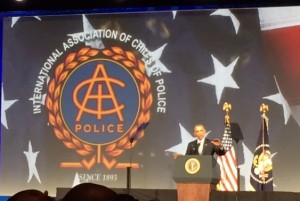By Leischen Stelter, managing editor for In Public Safety
President Obama delivered a nearly hour-long address during the International Association of Chiefs of Police (IACP) annual conference in an effort to gain support from law enforcement for his efforts to reform the criminal justice system and implement stricter gun-control laws.
Attendees of the largest law enforcement conference in the world expressed mixed impressions about Obama’s October 27 appearance. Rumors floated through the exposition hall about boycotts and general displeasure, but hundreds lined up five hours ahead of his remarks to get through security checkpoints.
Law enforcement leaders have openly criticized the President and his administration at IACP, most notably for the DOJ’s decision not to challenge recreational marijuana laws in Washington and Colorado, a measure many police agencies felt sidelined and ill-prepared to enforce.

To build support from this skeptical audience, Obama delivered a speech that addressed many of the challenges police face. He started by thanking law enforcement for risking their lives to “provide the security that so many Americans take for granted.” He also acknowledged the social failures that often fall on the shoulders of police. “Too often law enforcement gets scapegoated for the broader failures of our society and our criminal justice system,” he said.
To remedy some of these failures, Obama discussed three main issues: the need to provide law enforcement with necessary resources and funding; reforming the criminal justice system so it is smarter and fairer; and reducing the risks officers face by implementing common-sense gun safety reforms, which received the most applause from the audience.
Financial Support and Reallocating Funds Through Reform
He borrowed a saying from Vice President Joe Biden: “Show me your budget and I’ll tell you what you value.” The President discussed his request for Congress to increase funding for the COPS program “so we can hire even more police officers and make sure you have the training and equipment you need. That’s what I value. It’s in my budget,” he said.
The President also addressed reforming the criminal justice system, which made national news recently when police chiefs from the nation’s largest cities went to D.C. to advocate for changes to the criminal justice system.
“I believe valuing law enforcement means giving them resources, but it’s more than funding our priorities, funding helps, more police officers helps, but we’ve got to do more. So the second thing is we have to fundamentally reform our criminal justice system and make it easier for officers to do their jobs effectively,” he said.
He discussed improving education and providing job opportunities to young people. He mentioned increasing drug treatment programs to provide help, rather than incarcerating, those with drug addictions. Such actions, he said, can help stop crime before it starts.
“It’s not enough to tell our young people that crime doesn’t pay if they have no prospects at all. We’ve got to make sure they grow up knowing that hard work and responsibility pay off and that they’ve got other paths available to them,” he said.
It’s also important, he said, that our criminal justice system ensures that the punishment fits the crime. “It is possible for us to come up with strategies that effectively reduce the damage of the drug trade without relying solely on incarceration. And the reason I say that is because we’ve seen states and local police departments and law enforcement doing it,” he said. “So let’s take some of the $80 billion we spend each year to keep people locked up — not all of it, because like I said, some of those folks, you want behind bars — but let’s look at the system and see where are areas where we can use some of that money to help law enforcement go after drug kingpins, and violent gangs and terrorists.”
Community Policing
Obama also talked about the importance of rebuilding trust between officers and the communities they serve. “Now, look, I’m not naïve. I’m not suggesting that any of this is easy. A lot of times it means more resources for police departments because it’s more labor intensive. If you want that kind of community policing, then you got to have enough police to be able to do that because it takes time to do more than just respond to a call,” he said. “Good community policing has to be a two-way street. The communities that desperately need effective policing have to give police officers the benefit of the doubt and have to work with the police department to make sure you’ve got the resources and support to effectively implement strategies that we know work.”
Common-Sense Gun Safety Laws
The President’s discussion about implementing national criminal background checks received the most applause from the audience. “The IACP and the overwhelming majority of the American people — Democrat and Republican — believe we should require national criminal background checks for anybody who wants to purchase a gun. That’s why the IACP believes we shouldn’t sell military-style assault weapons to civilians. They don’t need them. They don’t need them to hunt a deer. It’s just a simple proposition — cops should not be out-armed by the criminals that they’re pursuing,” Obama said.
Obama pledged to keep calling on Congress to change how they think about gun safety. And, he said, if they don’t he’s going to call on the American people to change the people in Congress until they get it right.
While the speech to law enforcement may help build and restore support, or at least generate discussion of the President’s proposals, the true support will only come from the administration’s actions. “It’s time more folks in Washington started valuing our cops, not just giving lip service to it,” he said, to loud applause from the audience. Let’s hope the President takes his own advice.
Comments are closed.